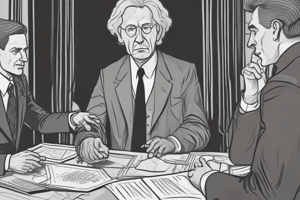Podcast
Questions and Answers
What is conflict?
What is conflict?
Conflict refers to a natural disagreement or struggle between people which may be physical or between conflicting ideas.
What are conflict theories?
What are conflict theories?
Conflict theory states that tensions and conflicts arise when resources, status, and power are unevenly distributed between groups in society.
What is conflict resolution?
What is conflict resolution?
Conflict resolution is the methods and processes involved in facilitating the peaceful ending of conflict.
What is the main difference between litigation and arbitration?
What is the main difference between litigation and arbitration?
What are the conflict resolution strategies developed by Kenneth Thomas and Ralph Kilmann?
What are the conflict resolution strategies developed by Kenneth Thomas and Ralph Kilmann?
Competing and accommodating are opposites in conflict resolution strategies.
Competing and accommodating are opposites in conflict resolution strategies.
What characterizes the compromising conflict resolution strategy?
What characterizes the compromising conflict resolution strategy?
What is a common behavior of someone using the avoiding strategy?
What is a common behavior of someone using the avoiding strategy?
What does collaborating in conflict resolution involve?
What does collaborating in conflict resolution involve?
Study Notes
Course Overview
- Focus on dispute resolution and crisis/incident management techniques.
- Emphasizes mediation and reconciliation among stakeholders.
- Addresses crises faced by criminal justice personnel.
Understanding Conflict
- Defined as a natural disagreement or struggle, it can be physical or ideological.
- Involves one individual or multiple people/groups with incompatible goals.
- The term "conflict" originates from the Latin "conflingere," meaning to come together for battle.
Conflict Theories
- Conflict arises from uneven distribution of resources, status, and power.
- Drives social change in society.
- Key theories:
- Feminist theory
- Class conflict theory
- Conflict culture theory
Conflict Resolution Definition
- Involves methods and processes for peacefully ending disputes.
- Can be interchangeable with dispute resolution, encompassing arbitration and litigation.
Arbitration vs. Litigation
- Litigation: Public dispute resolution through court involving judges or juries.
- Arbitration: Private process where parties agree on a neutral arbitrator to make a binding decision.
Conflict Resolution Strategies (Thomas-Kilmann Instrument)
- Developed by Kenneth Thomas and Ralph Kilmann.
- Identifies strategies based on assertiveness and cooperativeness:
- Avoiding
- Competing
- Accommodating
- Collaborating
- Compromising
Conflict Resolution Strategies Explained
- Avoiding (U & U): Ignoring the conflict, hoping it resolves itself.
- Accommodating (U & C): Prioritizing the other party's needs over one’s own.
- Compromising (Moderate A & C): Finding a resolution that partially satisfies all parties.
- Competing (A & U): Focusing on one's own desires at others' expense (opposite of accommodating).
- Collaborating (A & C): Developing solutions that fully satisfy all parties' concerns (opposite of avoiding).
Assertiveness and Cooperativeness
- Each resolution strategy involves varying degrees of assertiveness and cooperativeness.
- Accommodating: High cooperativeness, low assertiveness.
- Competing: Low cooperativeness, high assertiveness.
Studying That Suits You
Use AI to generate personalized quizzes and flashcards to suit your learning preferences.
Related Documents
Description
This quiz covers the essential concepts and theories related to conflict resolution and incident management in the criminal justice field. Explore different methods such as mediation and reconciliation, and understand the societal implications of conflict theories. Test your knowledge of key definitions and distinctions between arbitration and litigation.




